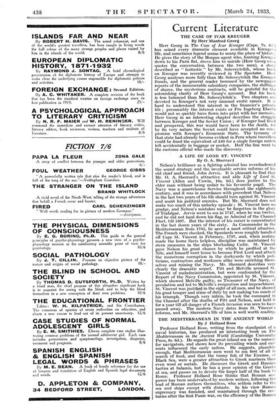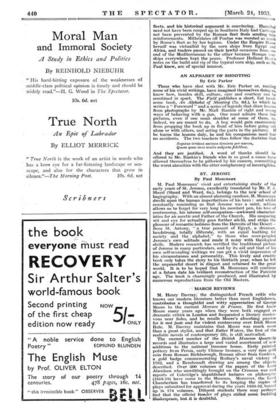THE MEDITERRANEAN IN THE ANCIENT WORLD By J Holland Rose
Professor Holland Rose, writing from the standpoint of a naval historian, has produced an interesting book on The Mediterranean in the Ancient World (Cambridge University Press, 8s. 6d.). He regards the great inland sea as the nursery for navigators, and shows how its prevailing winds and cur- rents influenced the early -sailors. He suggests, plausibly enough, that Mediterranean men went to sea first of all in search of food,' and that the tunny fish of the "Euxime, or Black Sea, were a greater attraction to Greek mariners than even wool or metals. He discusses the Greek and Russian tactics at Salamis, but he has a poor opinion of the Greeks at sea, and passes on to devote the larger half of the book to Rome. Professor Holland Rose thinks that Roman sea- power has been undervalued by modern writers, following the lead of Roman authors themselves, who seldom refer to the sea and ships except with distaste. In his view Roman supremacy, was founded, and maintained through the cen- turies after the first Punic war, on the efficiency of the Roman fleets, and his historical argument is convincing. Hannibal need not have been cooped up in Southern Italy had Carthage not been prevented by the Roman fleet from sending hire reinforcements. Mithridates off Pontus was worsted as much by Rome's fleet as by her legions. Under the Empire Rome herself was victualled by the corn ships from Egypt and Africa, and traders passed on their lawful occasions from one end of the Mediterranean to the other because Roman war. ships everywhere kept the peace. Professor Holland Rose's notes on the build and rig of the typical corn ship, such as St. Paul knew, are of special interest







































 Previous page
Previous page